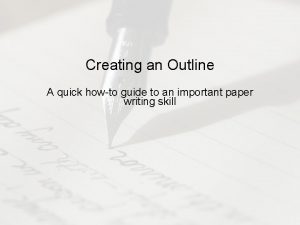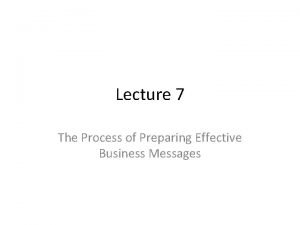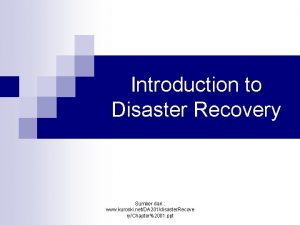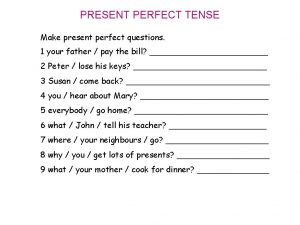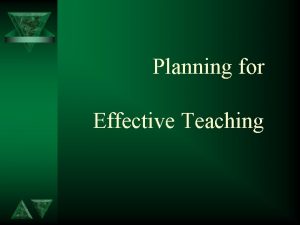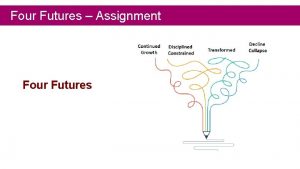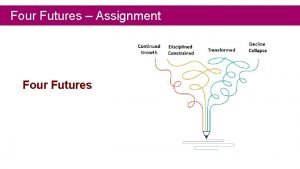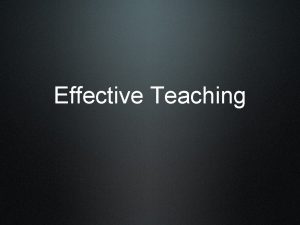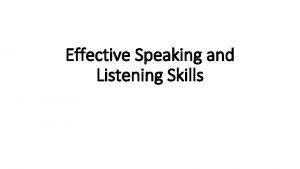Planning Effective Group Times Group times have four













- Slides: 13

Planning Effective Group Times Group times have four parts: the opening, body, closing, and transitions.

Group-Time Preparations & Strategies • Location – circle time – specific spot to sit • Focus • Pace and Variety • Materials – variety of props – concrete items • Advanced Preparation – always practice first! – have materials set up • Active Involvement – high interest activities – children INVOLVED • Group Time Teaching Methods (p. 119)

Group Time Variations • Greeting Times – songs, welcomes, daily routines - brief • Planning Times – picture plans, childinitiated, choice • Storytelling Groups – Know story, be dramatic, use pauses • Read-Aloud Times • Friendship Circles – social skills, “I care” • Class Meetings – positive discipline, children’s selfgovernment • Brainstorming Groups – KWHLH, charts

Continued Variations • Minilessons – Short and to the point, writer’s workshop • Author’s Chair – children share their writings, celebrate accomplishments of one another • Reporting Times – sharing, closure, reviewing

COMMON QUESTIONS FOR GROUP WORK • Should all children be required to participate in group time? • What are some strategies for facilitating conversations among a large group of children? • What should the group leader do when children interrupt a story or presentation?

COMMON QUESTIONS FOR GROUP WORK • What can be done to support easily distractible children? • What should the group leader do when children become unhappy or angry during group times? • What about show-and-tell?

Adapting Whole Group Instruction to Children of Different Ages and Abilities Younger Children: Short in duration, high on participation, low on talk, short songs & stories, familiarity

Adapting Whole Group Instruction to Children of Different Ages and Abilities Older children: longer in duration, high in participation, discussion, complexity, surprise, factual & problem solving information

Pitfalls to Avoid in Planning Group Times

Planning a Field Trip • What is the purpose of the trip? • What is your destination? – Does the site allow children to “be children? ” – Does site support educational goals? – Length of the trip/needs/disabilities/safety • When will the trip take place? • How will children get to the site? – Walking, transportation, car seats? ? ?

Planning Field Trips • What kind of supervision will be necessary? – Minimum of two adults – Use of parent volunteers • How will permission be obtained for children to participate? – Written permission or CAN’T GO – Follow-up phone calls and reminders

Planning Field Trips • How can parents and other family members be involved? • How will the lesson continue after the field trip is over? – Reinforcing activities – Do not leave LEARNING to chance • What is your backup plan? – Weather, sicknesses, backup box, first aid

Following the Field Trip • • Group discussion Photos from trip Art/Collages Story dictations Journal Writing Book making Pretend play with blocks or props • Role plays • Items collected from trip • Math story problems • Cooperative groups • Repeat visits • THANK YOU NOTES - A MUST!
 Some animals are dangerous *
Some animals are dangerous * Pentagonal prism vertices
Pentagonal prism vertices Factors of 168
Factors of 168 Four main components for effective outlines
Four main components for effective outlines What are the characteristics of an effective law
What are the characteristics of an effective law 5 planning steps of effective business messages
5 planning steps of effective business messages Principles of effective planning
Principles of effective planning If a neighbor pushes a lawnmower four times
If a neighbor pushes a lawnmower four times If a neighbor pushes a lawnmower four times
If a neighbor pushes a lawnmower four times Make present perfect question
Make present perfect question Which letter e specimen has 10 times magnification
Which letter e specimen has 10 times magnification 8 elements of an effective compliance program
8 elements of an effective compliance program Master aptitude emotional intelligence
Master aptitude emotional intelligence Please clean your room
Please clean your room



